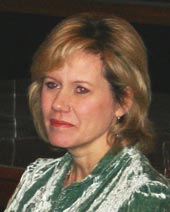Out of the Tunnel
THE KERGIN LECTURE

Rachel North
|

Susan Ormiston
|
The most riveting and moving University Grand Rounds
of the year was given by a patient -- Rachel North. After
hearing her speak on the BBC when he was in the UK,
Richard Reznick invited Rachel, a young British marketing
executive and writer, to be the Kergin Lecturer,
interviewed by the able CBC correspondent Susan
Ormiston.
Rachel told us the story of her experience on July
7, 2005, when a 19-year-old suicide bomber pushed
himself into the overcrowded carriage she was riding on
the London underground and detonated a rucksack full
of explosives, killing 26 people at Kings Cross Station.
Her heroic response was to lead survivors out of the
train, along the dark underground passage to the next
station. "Would we be electrocuted? Would there be more bombs?" She described her care by the doctors and
nurses and "ticket collectors who sprinted into the tunnel
and tore their shirts to try to stop the bleeding". Her
empathetic response to her rescuers and fellow survivors
is one of the most touching parts of her well-written
book Out of the Tunnel - inspiring summer reading.
|
When Hugh Scully asked, "Have you connected with
the first responders and the feelings that they have?"
Rachel told us, "There are several first responders in
King's Cross United, the support group of survivors
who continue to meet after the bombing. The police
officer who was the first man into the train, who had to
walk away from the carnage, suffered extremely severe
post-traumatic stress. He had been involved in several
traumatic events before and the 7th of July broke him.
Underground ticket collectors who led out the wounded
went on to suffer severely in the aftermath. I'm in
contact with fire officers who had to carry some of the
people out of the train without stretchers, using the
coats dropped by passengers. One of the most difficult
things for them is that as they carried out these people
two of them died in their arms. There is an enormous,
profound sense of gratitude to the first responders and
an enormous sense of compassion, because we ran away
- they went towards, which takes an extraordinary kind
of courage, because they're not protected by shock, they
are knowingly walking into things that are appalling and
that would make anybody despair. One of the things
that we found helpful was to go to the pub with these
people and say thank you. The police officer was particularly
stressed by the fact that we had to leave people
behind and he obsessed over it for a long time - the
people he had to walk away from knowing the last thing
they would see would be him walking away. It was only
when he met all the people who didn't die, and we were
all jumping on him saying thank you, thank you, you
were the first voice we heard, you were the person who
told us we were going to get out, that he was able to
recognize the fact that he had helped, that he had been
part of people's recovery. So we owe a great debt; these
people are heroes."
Chris Feindel asked what we can learn from her
experience to help the patients who cope with the psychological
and physical trauma we inflict as surgeons.
"Help them feel that they are in control - not helpless
victims."
There is a back story of an earlier experience that
helped prepare Rachel North for her ordeal. Read about
it in her book, or visit http://rachelnorthlondon.blogspot.com/
M.M.
|